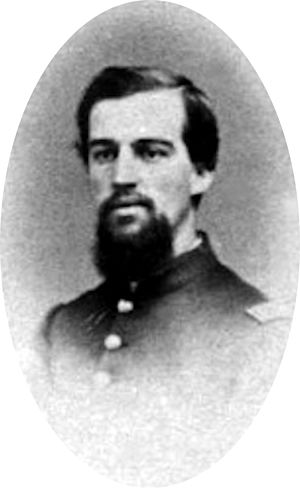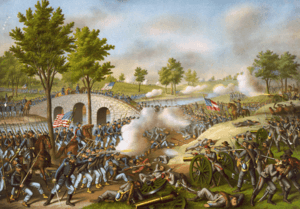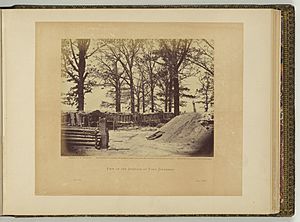Thomas W. Hoffman facts for kids
Quick facts for kids
Thomas William Hoffman
|
|
|---|---|

Hoffman in 1865
|
|
| Born | July 21, 1839 Berrysburg, Pennsylvania |
| Died | April 18, 1905 (aged 65) Scranton, Pennsylvania |
| Buried |
Pomfret Manor Cemetery, Sunbury, Pennsylvania
|
| Allegiance | |
| Service/ |
|
| Rank | Brevet Lieutenant colonel |
| Unit | 1.) Company E, 72nd Pennsylvania Infantry (1861–1863) 2.) 143rd Company, 2nd Battalion, U.S. Veteran Reserve Corps (1863) 3.) Company A, 208th Pennsylvania Infantry (1864–1865) |
| Battles/wars | American Civil War |
| Awards | |
Thomas William Hoffman (July 21, 1839 – April 18, 1905) was a brave American soldier. He fought for the Union Army during the American Civil War. He was part of the 208th Pennsylvania Infantry regiment.
Hoffman received the Medal of Honor, America's highest military award. He earned it for his "extraordinary heroism" on April 2, 1865. This happened during the Third Battle of Petersburg in Virginia. He bravely stopped his regiment from retreating during a tough fight. He received this special award on July 19, 1895.
Contents
Early Life in Pennsylvania
Thomas William Hoffman was born in Berrysburg, Pennsylvania, on July 21, 1839. His parents were Amos and Amanda Hoffman. He grew up in Dauphin County, Pennsylvania.
He had several brothers and sisters. In 1850, Thomas lived with his family on their farm. This farm was in Lykens Township, Dauphin County, Pennsylvania.
Fighting in the Civil War
Thomas Hoffman joined the army when he was 25 years old. He signed up in Philadelphia on August 10, 1861. He became a private in Company E of the 72nd Pennsylvania Infantry. This group was also known as the "Fire Zouaves."
First Battles and Transfers
His regiment traveled to Virginia. He fought in the Battle of Ball's Bluff in October 1861. He also took part in advances led by Nathaniel P. Banks towards Winchester.
Hoffman fought in many important battles. These included the Seven Days Battles in 1862. He was also at Antietam in September 1862. Later, he fought at Fredericksburg and Chancellorsville.
In October 1863, he moved to a different unit. This was the U.S. Veteran Reserve Corps. He was honorably discharged from this unit later.
Raising a New Regiment
After his first service, Hoffman went back home. He helped to form a new regiment. This new group was the 208th Pennsylvania Infantry.
He rejoined the army and became a captain. Pennsylvania Governor Andrew Gregg Curtin gave him this rank. On September 7, 1864, he took charge of Company A. His younger brother, Jacob, also served in his company.
Key Campaigns and Heroism
Hoffman and the 208th Pennsylvanians were busy. They helped defend Bermuda Hundred, Virginia. This was part of the Siege of Richmond. They did guard duty and other tasks.
Later, they supported Union troops near the Weldon Railroad. They also fought in the battles of Dabney's Mill and Hatcher's Run. They were also at Fort Stedman in March 1865.
During the Appomattox Campaign, Hoffman showed great bravery. On April 1, he was an acting engineer officer. The next day, he performed the heroic act that earned him the Medal of Honor.
Stopping a Retreat
Hoffman later described what happened that day. Their division was ordered to capture enemy forts. The attack began at daylight. Union troops quickly captured four forts and many prisoners.
The enemy tried hard to get the forts back. They attacked many times, but the Union soldiers held their ground. At one point, Hoffman was sent to check on a brigade.
He arrived as his own regiment, the 208th, was fighting. He heard an officer tell the men to retreat. The officer and major then ran away. Hoffman quickly understood the danger. He pulled out his sword and shouted: "Don't a man of you run; they can't drive you out of here!"
His words rallied the other officers. They helped keep the men in position. Because of his courage, the regiment did not retreat.
After the War
For his bravery, Hoffman was promoted to major. After the battle, his regiment chased Robert E. Lee's army. Lee surrendered to Ulysses S. Grant at Appomattox.
Hoffman's regiment then moved to Washington, D.C. They took part in the Grand Review of the Armies. This was a big parade celebrating the Union victory.
On June 1, 1865, Hoffman was honorably discharged. He was promoted again on August 2, 1865. He became a lieutenant colonel. He wrote a thank you note from his home in Port Trevorton, Pennsylvania.
Life After the Military
After the war, Hoffman returned to Pennsylvania. On June 27, 1865, he married Sallie F. Shindel. She was from Gratz, Pennsylvania. They had three daughters: Susan, Mary, and Elizabeth.
By 1890, Hoffman lived in Mount Carmel. His wife, Sallie, passed away that year. She was buried in Sunbury, Pennsylvania.
Almost a year later, he married Helen Delucia Fisk. She was a doctor. They were married in New York in April 1892.
Later in life, Hoffman worked as a bookkeeper. He lived in Scranton, Pennsylvania, with his second wife.
Final Years
Thomas Hoffman passed away on April 18, 1905. He was 65 years old. He died in Scranton, Pennsylvania. His body was taken by train to Sunbury, Pennsylvania. He was laid to rest at the Pomfret Manor Cemetery.
 | DeHart Hubbard |
 | Wilma Rudolph |
 | Jesse Owens |
 | Jackie Joyner-Kersee |
 | Major Taylor |



